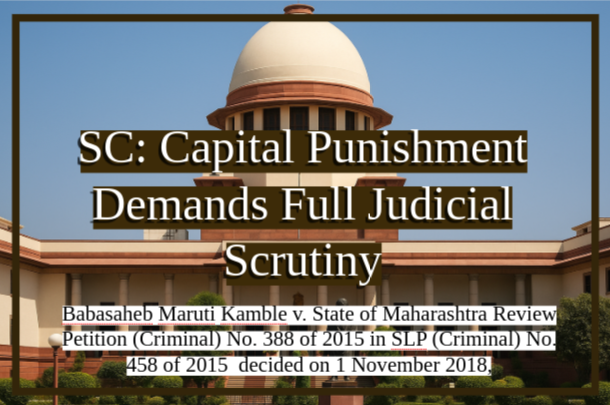Visually Impaired Recruitment in Judicial Services : What SC Says?
- M.R Mishra

- Mar 4, 2025
- 3 min read
On March 3, 2025, the Supreme Court of India delivered a historic judgment that is poised to reshape judicial recruitment in the country. In a decision penned by Justices J.B. Pardiwala and R. Mahadevan, the Court tackled critical issues surrounding the exclusion of visually impaired and other Persons with Disabilities (PwDs) from judicial services.
“Our constitution is color-blind, and neither knows nor tolerates classes among citizens. In respect of civil rights, all citizens are equal before the law.”
said, Justice John Marshall Harlan in Plessy v. Ferguson (1896)
The case, which stemmed from multiple petitions—including Suo Motu Writ Petitions challenging discriminatory practices in Madhya Pradesh and Rajasthan—brought to light the harsh realities faced by candidates like Alok Singh and Ayush Yardi, who were denied opportunities solely on the basis of their disabilities.
The judgment delved deep into the suitability of visually impaired candidates for judicial roles. The Court unequivocally stated that such candidates should never be deemed unsuitable simply because of their visual impairment. Rather than relying on clinical evaluations, the focus must be on a candidate’s capabilities when provided with reasonable accommodations.
Citing examples of visually impaired judges and legal professionals from around the globe, the Court highlighted that visual impairment is not a barrier to judicial excellence.
In its sweeping reform, the Supreme Court struck down Rule 6A of the Madhya Pradesh Judicial Service Rules—a rule that had effectively barred visually impaired candidates from joining the judiciary. The decision labeled this exclusionary measure as arbitrary and rooted in outdated stereotypes, in direct violation of the constitutional guarantees of equality under Articles 14 and 16.
Visually impaired candidates are eligible to participate in selection for the posts under the judicial service and hence, Rule 6A of the Madhya Pradesh Judicial Service (Recruitment and Conditions of Service) Rules, 1994 is struck down insofar as it excludes visually impaired and low vision candidates for appointment in judicial
service.
Similarly, the Court invalidated a proviso in Rule 7 that imposed extra requirements, such as mandating three years of practice or a minimum of 70% marks in the first attempt at a law degree. This additional hurdle was deemed discriminatory, contradicting the principle of reasonable accommodation that should ensure equal opportunity for PwDs.
(ii) Rule 7 of the Madhya Pradesh Judicial Service (Recruitment and Conditions of Service) Rules, 1994 to the extent of prescribing additional requirement of either a three-year practice period or securing an aggregate score of 70% in the first attempt, is struck down insofar as it applies to PwD candidates. The said rule will be
applicable to the PwD candidates insofar as it prescribes the educational and other...
Further underscoring its commitment to inclusivity, the Court upheld that a relaxation in selection criteria is not only acceptable but necessary when there is a scarcity of PwD candidates.
Referencing an Office Memorandum from January 15, 2018, the judgment affirmed that such relaxations, far from compromising the quality of judicial services, are crucial for leveling the playing field. Additionally, the directive to maintain separate cut-off marks for visually impaired candidates was a significant move toward ensuring transparency and fairness in the recruitment process.
This landmark judgment reaffirms the constitutional rights of PwDs and strengthens the framework for their inclusion in public services. It emphasizes that disability-based discrimination is not only unjust but unconstitutional, and that reasonable accommodations are essential for enabling every individual to perform to their fullest potential.
As the judiciary leads by example, this decision is expected to inspire similar reforms across other sectors, paving the way for a more diverse and representative workforce.
As India marches toward a more inclusive society, this judgment serves as a powerful reminder that disability is no barrier to excellence. The legal system, acting as the guardian of the Constitution, now carries an even greater responsibility to ensure that every citizen is provided the opportunity to contribute meaningfully to the administration of justice.
Details:
IN RE RECRUITMENT OF VISUALLY IMPAIRED IN JUDICIAL SERVICES VS. THE REGISTRAR GENERAL THE HIGH COURT OF MADHYA PRADESH -
SMW(C) No. 2/2024 -
Diary Number 7900 / 2024 - 03-Mar-2025







Amazing !!